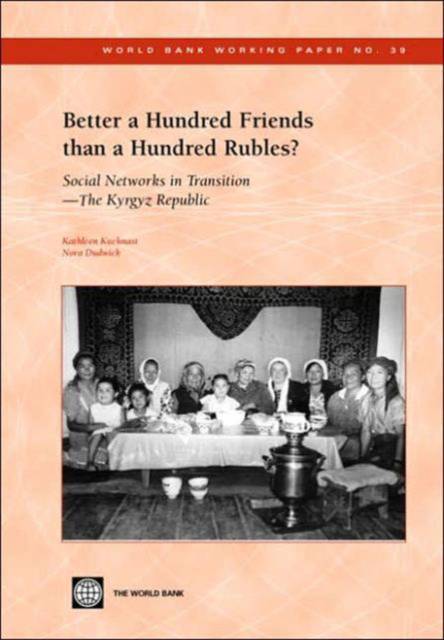
- Retrait gratuit dans votre magasin Club
- 7.000.000 titres dans notre catalogue
- Payer en toute sécurité
- Toujours un magasin près de chez vous
- Retrait gratuit dans votre magasin Club
- 7.000.0000 titres dans notre catalogue
- Payer en toute sécurité
- Toujours un magasin près de chez vous
Better a Hundred Friends Than a Hundred Rubles?
Social Networks in Transition - The Kyrgyz Republic
Nora Dudwick, Kathleen KuehnastDescription
The study of social networks in post-socialist countries is an important tool for bridging the policy gap between macro-level economic strategies and micro-level interventions. Better a Hundred Friends than a Hundred Rubles? examines the impact of economic transition and poverty on social networks in the Central Asian country of the Kyrgyz Republic.
The findings of this study illustrate the notable impact of poverty on the form and function of informal social networks of the poor and non-poor. They reveal the dynamics of how the poor both disengage from and are isolated by and from the non-poor. The study further describes how the social networks of poor and non-poor households have polarized and separated in a process that parallels the sharp socioeconomic stratification that has taken place since national independence in 1991. It also examines not only how the networks have separated, but also how each has changed in character.
Spécifications
Parties prenantes
- Auteur(s) :
- Editeur:
Contenu
- Nombre de pages :
- 80
- Langue:
- Anglais
- Collection :
- Tome:
- n° 39
Caractéristiques
- EAN:
- 9780821358986
- Date de parution :
- 10-07-04
- Format:
- Livre broché
- Format numérique:
- Trade paperback (VS)
- Dimensions :
- 177 mm x 237 mm
- Poids :
- 167 g

Les avis
Nous publions uniquement les avis qui respectent les conditions requises. Consultez nos conditions pour les avis.






